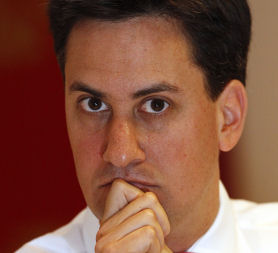Let's Do What, Jacinda? You are only too aware, Jacinda, of what needs to be done to heal the harms inflicted on New Zealanders these past nine years. You also know they cannot be healed on the cheap. Strict adherence to the Labour/Green “Budget Responsibility Rules” will force your government to break its promises – to break your promises.
IT’S NOT TOO LATE, JACINDA. Not yet. But it soon will be. If
you keep following the economic and fiscal track you’re on, then the campaign
that started with such promise will end in some sort of tawdry compromise with
an already discredited status-quo. Or, even worse, in yet another electoral
failure. If you begin your career as Labour’s leader by deferring to the Powers
That Be, then you will spend the rest of your political life living in fear of
them.
“Let’s do this”, your own brilliant slogan, works because it
communicates fierce personal determination and raw political urgency in equal
measure. But, the person who says “let’s do this” doesn’t immediately add “but
only if my colleagues concur”, or, “providing the business community doesn’t
object”. The power of the slogan lies in the reassurance it offers that Jacinda
Ardern knows what needs to be done – and is not about to let anyone stop her
from doing it. Labour has already endured four equivocal leaders, it absolutely
does not need a fifth.
But that is what you have begun to do, Jacinda: equivocate.
On the subject of taxation, in particular, there is a growing sense that you’re
not being straight with the electorate.
You could have looked your fellow New Zealanders squarely in
the eye and asked them to tell you, honestly, whether they believe that enough
has been spent on housing the homeless, improving mental health care, upgrading
our hospitals and schools, expanding public transport and cleaning up the environment.
And, when they said “No”, you could have asked them if they were willing to pay
just a little bit more in tax to make good New Zealand’s shocking social
deficit. And, when they said “Yes”, you could have nodded decisively and said:
“Right. Good. Let’s do this!”
Instead, you have waffled-on about handing over the
re-design of New Zealand’s taxation system to a “working group” of “experts”.
Telling your inquisitors at the NZ Herald
that you were being forthrightly “transparent” about being frustratingly opaque
– as if that was a good thing!
One of those inquisitors, the business journalist Fran
O’Sullivan, was speaking no more than the truth when she told “Morning Report”
listeners that a party which has been in Opposition for nine years has had more
than enough time to sort out exactly what they want to do and how they intend
to pay for it. Because, if the people we pay $170,000 per annum to sit in the
House of Representatives aren’t “experts”, then who the hell are? A bunch of
bank economists and corporate tax accountants? Are you seriously going to ask
people like this to design your Labour government an equitable system of
progressive taxation? Really, Jacinda? Really!
A week or so ago I urged you to reach back into Labour’s
past for inspiration about how to pay for your promise to build enough houses
to accommodate all those New Zealanders in need of a place to call their own.
This week I’m recommending you take a look at the “working group” of “experts”
who designed Labour’s social welfare reform “package” back in the 1930s. The
artist and author, Bob Kerr, called them “The Three Wise Men of Kurow”.
Arnold Nordmeyer, Andrew Davidson and Gervan McMillan rough-out New Zealand's future social welfare system around McMillan's dining-room table. Watercolour by Bob Kerr
Kurow is a tiny town in North Otago situated above the
Waitaki River. In the grim years of the Great Depression it was a place of
considerable privation and distress. Determined to relieve that distress were
the local doctor, Gervan McMillan; the local Presbyterian minister, Arnold
Nordmeyer; and the local schoolmaster, Andrew Davidson. Between them, these men
devised a scheme to take care of the workers on the nearby hydro-electric
project and their families. Working around McMillan’s dining-room table they
went on to rough-out a way of scaling-up their highly successful local effort
into a nationwide welfare scheme. McMillan and Nordmeyer, who were Labour
members, presented their ideas to the Party’s 1934 Annual Conference – which
seized upon their plan with eager hands. Four years later, the First Labour
Government passed the Social Security Act.
Nobody paid these men for their nights around Gervan McMillan’s
dining-room table. No one supplied them with detailed Terms of Reference. No
public relations firm was engaged to “sell” their ideas to the voters. “Let’s
do this!”, said the three wise men of Kurow, for no better reason than “this”
needed to be done – and Labour was willing to do it.
You are only too aware, Jacinda, of what needs to be done to
heal the harms inflicted on New Zealanders these past nine years. You also know
they cannot be healed on the cheap. Strict adherence to the Labour/Green “Budget
Responsibility Rules” will force your government to break its promises – to
break your promises.
The increased public spending New Zealand so urgently needs
can only be funded in two ways. Either it is paid for out of an expanded
revenue base, or, out of an increased deficit. Unfortunately, Jacinda, you
appear to be ruling out the former, and the Budget Responsibility Rules are
ruling out the latter.
So, Jacinda, when you say “Let’s do this”, what, exactly, do
you mean? Don’t you think it’s time for you to be completely transparent about
what “this” is – and to whom it is done?
This essay was
originally posted on The Daily Blog
of Saturday, 26 August 2017.





